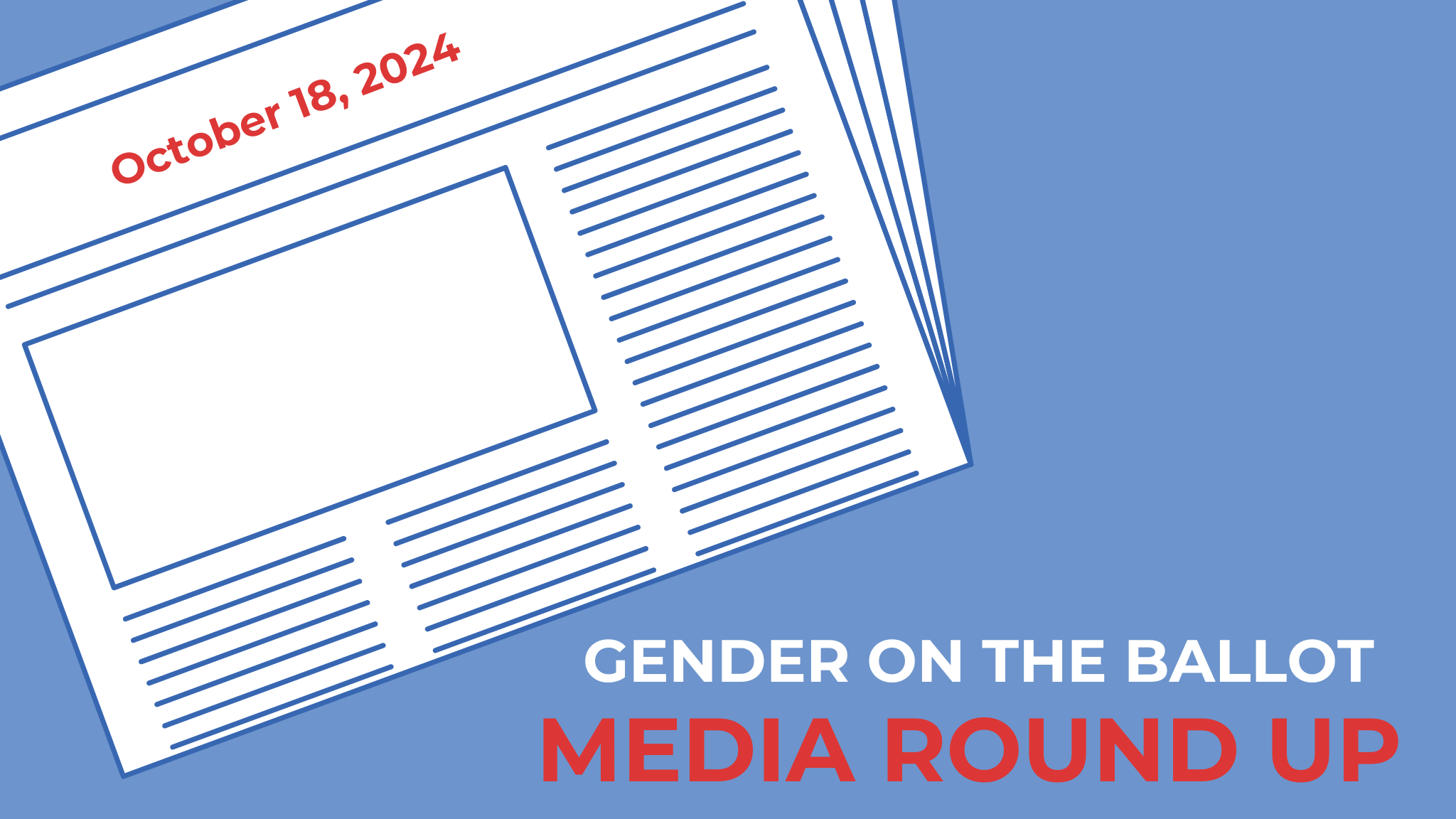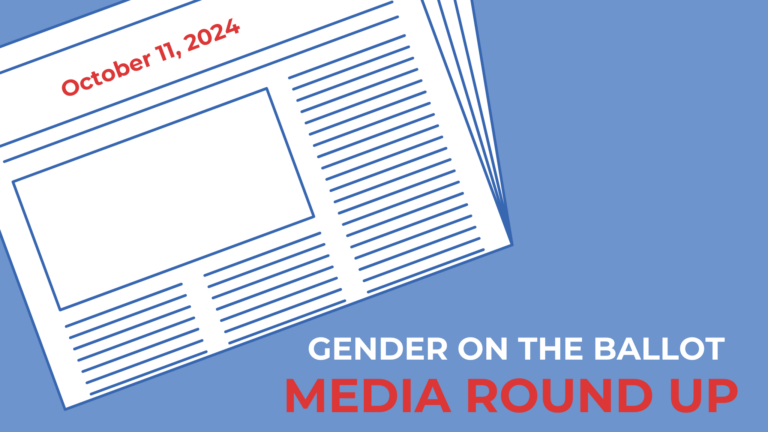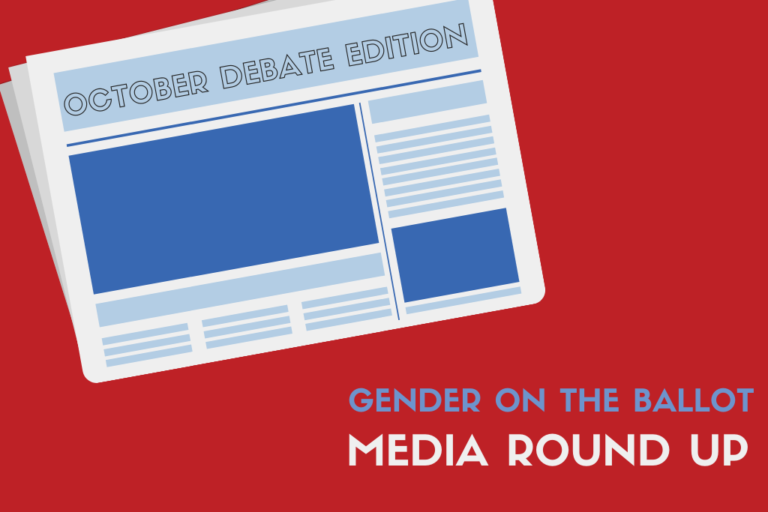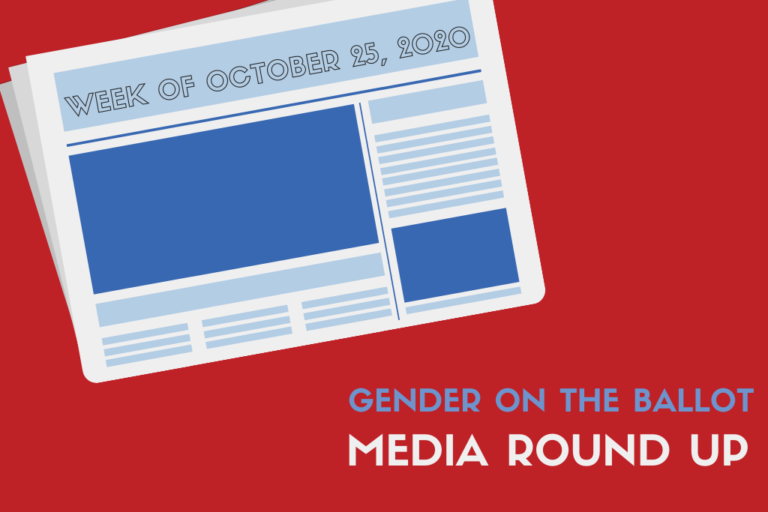Happy Friday! Welcome to our Media Round Up. Each week we’re collecting and sharing our…
Weekly Media Round Up: October 18, 2024

Happy Friday! Welcome to our Media Round Up. Each week we’re collecting and sharing our favorite gender + politics stories.
Health Issues Motivating Black Women Voters for Harris
The Washington Post, Stephanie Armour and McKenzie Beard
Vice President Kamala Harris is making inroads with Black women voters on the campaign trail, who are rallying behind her because of her promises to preserve abortion access, protect reproductive freedom, and reduce maternal mortality rates. Her call to action to reduce high U.S. maternal mortality rates has particularly resonated with Black women, who are three times as likely to die of pregnancy-related complications than White women. With an upcoming presidential election that could be decided by razor-thin margins, support from this key voting bloc is crucial – eighty-two percent of Black women voters had a favorable view of Harris in August, according to the Pew Research Center; additionally, almost seventy percent of this key voting bloc said they were “extremely or very motivated to vote,” up from fifty-one percent before Harris announced her candidacy in July.
Polls Show Women Are Highly Motivated to Vote
A new KFF survey reveals an important shift in women voters’ motivation to head to the ballot box this November. Overall, the percentage of women respondents who said they were “more motivated than normal” jumped nearly twenty points from the previous survey KFF conducted in June, driven by a large surge among Democratic women. Democratic women were also more likely to describe themselves as satisfied with their choice of candidates in the upcoming election, perhaps indicating their approval of Vice President Kamala Harris’ decision to enter the race. When polling prospective women voters about the issues that matter the most to them, abortion emerged as the most important issue for women under thirty, which also marks a “notable change” since KFF’s previous poll in late spring. Nearly four in ten women under thirty told pollsters that abortion is the “most important issue to their vote.”
At Town Hall on Women’s Issues, Trump Renews ‘Enemy Within’ Talk
The New York Times, Maya King
A Fox News town hall on Tuesday billed as a conversation about women’s issues, included a little over 100 women from local churches and mothers’ groups near Atlanta, GA. Former President Donald Trump reiterated his conviction that Democrats are the “enemy from within.” Adding that the party is a “threat to democracy,” Trump repeated concerns that Democrats have Marxist and communist sympathies, rebuffing them as a “party of sound bites.” Trump also spoke about abortion when asked about the Republican Party’s stance on the issue, defending leaving the decision on abortion access to individual states; he also expressed support for exceptions for sexual assault and protecting the life of the mother. The town hall comes as both Trump and Vice President Kamala Harris try to shore up last minute support from crucial voting blocs ahead of the upcoming general election.
Michelle Obama to Host a Rally to Encourage Voter Turnout in Georgia
The New York Times, Katie Rogers
On October 29th, former First Lady Michelle Obama makes a relatively rare public appearance by hosting a rally in Georgia to encourage young people of color to vote in the 2024 election. The event is led by her organization When We All Vote, a nonpartisan group that encourages all Americans to register and vote. Mrs. Obama is one of the most popular figures in not only the Democratic party, but across the country. She is expected to add to the already record number of early voters in Georgia this cycle. The rally, hosted in Atlanta, comes after Mrs. Obama urged people to “do something” during a speech at this year’s Democratic National Convention in August to campaign for Vice President Kamala Harris. Happening just a week before election day, Michelle Obama hopes to rally more nonwhite voters to vote early.
The School for First Ladies Is Now in Session
The New York Times, Alyson Krueger
The First Lady role may not come with a job description or salary, but it comes with enormous responsibility and women in the role are energized and focused. In September, during the United Nations General Assembly in New York City, the Global First Ladies Alliance met for their biannual meeting to discuss pertinent global issues including health, education, economic empowerment, gender based violence, and their roles as leading women. Former First Lady Michelle Obama and current First Lady Dr. Jill Biden have attended these meetings in the past, and ladies from Nigeria, Guatemala, and Iraq are just a few of the countries represented. The Alliance is open to the 86 spouses of world leaders and over 200 of their senior staff members, and has spawned regional affiliates around the world for the unique group of women that so few can understand. “Even here, to this day, the office of the first lady is not written into the Constitution in America,” said Anita McBride, director of the First Ladies Initiative at the American University School of Public Affairs (who served as chief of staff to Laura Bush and was involved in the alliance in the early days). “There is no position, there is no salary, there is no statutory responsibility.” Interestingly, in 15 years, there has never been a male participant in the biannual Alliance meetings. For more insight into this important role, read Diana Carlin’s GOTB blog, The Inevitability of a First Gentleman In Our Lifetime.
A Key Demographic: Silent, White Women
The gender gap has been a defining characteristic in the 2024 election cycle, and it continues to build closer and closer to election day. Barbara Comstock, former Republican Representative from Virginia, says a “silent group of women” will be voting for Vice President Harris this year. Comstock, along with more that 100 prominent Republicans are publicly supporting Harris. Comstock hopes to speak to Republican voters in the suburbs to gather a larger Harris vote, saying that, “there’s a silent group of women who will crawl over broken glass to vote against Trump and who will quietly vote for Harris.” Moreover, the party demographic among white women voters is changing. In 2016 and 2020, Trump was able to secure a majority of the white female vote, but this year it is starting to shift towards Harris. The key driver of this is protecting reproductive rights. Post Dobbs, many women are voting to protect abortion rights and white women are a big chunk of this group. Although Harris’ shift is very small, any number of votes could decide this year’s election. These votes likely lie in “blue wall” states like Michigan, Wisconsin, and Pennsylvania where white women’s votes are in question. Both candidates are campaigning for the moderate white women vote, especially those who used to vote Republican but are disillusioned with the current Trump rhetoric towards women.
Lilly Ledbetter, Whose Fight for Equal Pay Changed U.S. Law, Dies at 86
The New York Times, Trip Gabriel and Claire Moses
Lily Ledbetter, a trailblazer in the women’s equal pay fight, has died at 86 in Alabama. Ledbetter led a triumphant campaign to gain equal pay after discovering she was earning $2,000 less annually than her male counterparts at her Goodyear Tire and Rubber Company job. This accounted for more than $200,000 across her career for a job that she had more seniority at than her male co-workers. Although Ledbetter would first win her sex discrimination lawsuit in 1999, awarding her $3 million, it would later be reversed in appellate court, and she would be further rejected by the Supreme Court. However, in 2009, President Obama signed the Lilly Ledbetter Fair Pay Act into law that eliminated the statute of limitations on equal pay issues. Although Ledbetter herself could not benefit from the law, she was present for the signing, and went on to devote her life to equal pay initiatives.
Who’s Missing at the Legislation Table: Moms
Axios, Torey Van Oot
At a time when gender is so prominent in our electoral landscape, one demographic is missing: moms. Despite 85% of women being mothers by the age of 45, only 25% of women and nonbinary legislators in the U.S. are parents, and of that, just 8% are mothers with children under 18. This lack of representation in our state’s capitals is worrying as legislation is created and enacted without these mothers in mind. The reality of such a job is long-hours, constant traveling, and low pay–something that most mothers can’t afford to take on. With only 2% of working mothers in state legislatures having children under 6, the various ways to fix these problems are focused on virtual events, increased pay, and easier access to childcare. To sufficiently reach representation nationwide, 700 more working mothers need to be elected.






